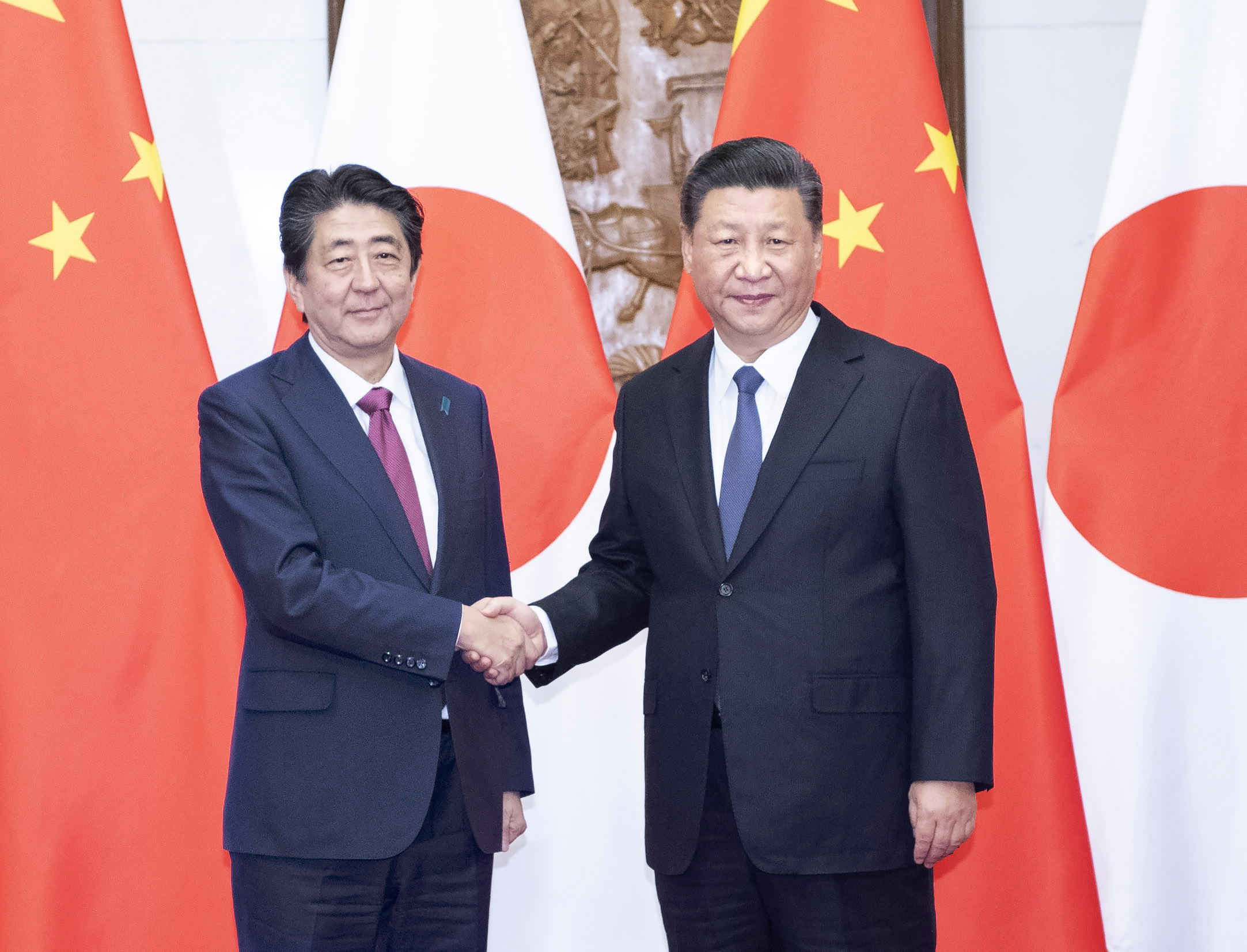BEIJING, Oct. 26 (Xinhua) -- China and Japan are eyeing "new development" after their ties have recently come back on track.
This was highlighted Friday as Chinese leaders met with Japanese Prime Minister Shinzo Abe, who is visiting Beijing this week. It has been the first official visit made by a Japanese prime minister since 2011.
"China and Japan, as close neighbors with great converging interests, are major world economies and influential countries," said President Xi Jinping during his meeting with Abe at the Diaoyutai State Guesthouse, expressing his appreciation for the prime minister's willingness to improve bilateral ties in recent years.

Chinese President Xi Jinping (R) meets with Japanese Prime Minister Shinzo Abe in Beijing, capital of China, Oct. 26, 2018. (Xinhua/Li Tao)
Prior to his visit, Abe has pledged many times to "shift from competition to coordination" between the two nations, which has been considered as a sign that the Japanese side has changed its attitude toward China.
"The healthy, steady and long-term development of China-Japan ties is in the fundamental interests of the two countries' people, and represents common expectations of the international community," Xi said.
He said the China-Japan ties had been "back on track" and gained positive momentum with concerted efforts by both sides.
"This is worth cherishing," said Xi.
Echoing Xi, Abe said he was glad to pay an official visit to China on the occasion of the 40th anniversary of the signing of the China-Japan Treaty of Peace and Friendship, and that he hopes the two sides will open up a new era of the Japan-China relationship through his visit.
The treaty, signed by the elder generation of leaders of both countries, has established a general direction of lasting peace, friendship between the two countries in the form of law, and provided solid support for both sides to conduct mutual beneficial cooperation, achieve common development, and properly deal with sensitive historical issues and the Taiwan issue.
A reception marking the anniversary of the treaty was held Thursday at the Great Hall of the People in Beijing, with the attendance of Premier Li Keqiang and Abe, as well as some 800 representatives from both countries.
"The Japanese side stands ready to work with China to increase high-level exchanges and exchanges at other levels, continuously gain the public support for China-Japan friendship, properly manage differences and advance the in-depth development of strategic beneficial relationship," Abe said during his meeting with Xi.
Gao Hong, an expert on China-Japan ties with the Chinese Academy of Social Sciences, said: "Direct meetings between leaders of China and Japan during the visit have further improved mutual political trust and provided political guarantee for future bilateral cooperation."
ENHANCED ECONOMIC TIES
Pragmatic cooperation serves as "ballast" and a "thruster" for the development of China-Japan relations, Premier Li told Abe Friday.
"China will unswervingly forge ahead opening-up to the world, promote fairer regulation, strictly protect intellectual property rights and create a market-oriented, law-based and internationalized business environment," Li said.
He encouraged Japanese enterprises to take the opportunities of China's new round of opening-up and invest in China, adding that China was willing to enhance financial cooperation with Japan via currency swaps.
The People's Bank of China, the central bank, said Friday that it had inked a bilateral currency swap agreement with its counterpart of Japan, a move aimed at enhancing financial stability of the two countries and facilitating bilateral economic and financial exchanges. The agreement will allow the two sides to swap a total of 200 billion yuan (about 28.78 billion U.S. dollars) for 3.4 trillion Japanese yen, and vice versa.
The past 40 years has witnessed Japan's increasingly extensive engagement in China's reform and opening up process.
"China's economic development presents huge opportunities welcomed by Japan and the rest of the world," Abe said in a written interview with Chinese media on the eve of his visit to China. "The economies of the two countries are inseparable."
A case in point is that China-Japan bilateral trading volume bounced back to above 300 billion U.S. dollars in 2017, making China the largest trading partner with Japan.
The China-proposed Belt and Road Initiative also provides a new platform and experimental field for mutually beneficial cooperation between the two countries.
Hailing the above-mentioned initiative as a vision with great potential, Abe expressed the readiness to strengthen cooperation with China in multiple fields, including the third-party markets.
At a forum on third-party market cooperation held Friday in Beijing, 50 plus cooperation agreements worth more than 18 billion U.S. dollars were signed, an indication that cooperation in this regard is bound to become a new pillar for pragmatic cooperation.

Chinese Premier Li Keqiang and Japanese Prime Minister Shinzo Abe attend the first China-Japan forum on third-party market cooperation at the Great Hall of the People in Beijing, capital of China, Oct. 26, 2018. (Xinhua/Li Tao)
UNITED FRONT ON FREE TRADE
Upholding multilateralism and promoting economic integration of the Asia-Pacific region are also issues of common concern during Abe's China visit.
In his meeting with Abe, Premier Li called on the two sides to boost trade and investment in the region and jointly build an East Asia economic community to promote the process of the Asia-Pacific regional integration.
Pledging to build a free and just international economic order, Abe said he hoped to work with China in pushing for concrete progresses of Regional Comprehensive Economic Partnership negotiations, thus contributing to free trade and world economic development.
"In face of the momentum of unilateralism and protectionism with the rule-based international order being gravely challenged, China and Japan find it imperative to strengthen communication and cooperation to maintain an economic order, as a way to promote better global governance," said Ruan Zongze, executive vice president and senior fellow at China Institute of International Studies. Enditem



